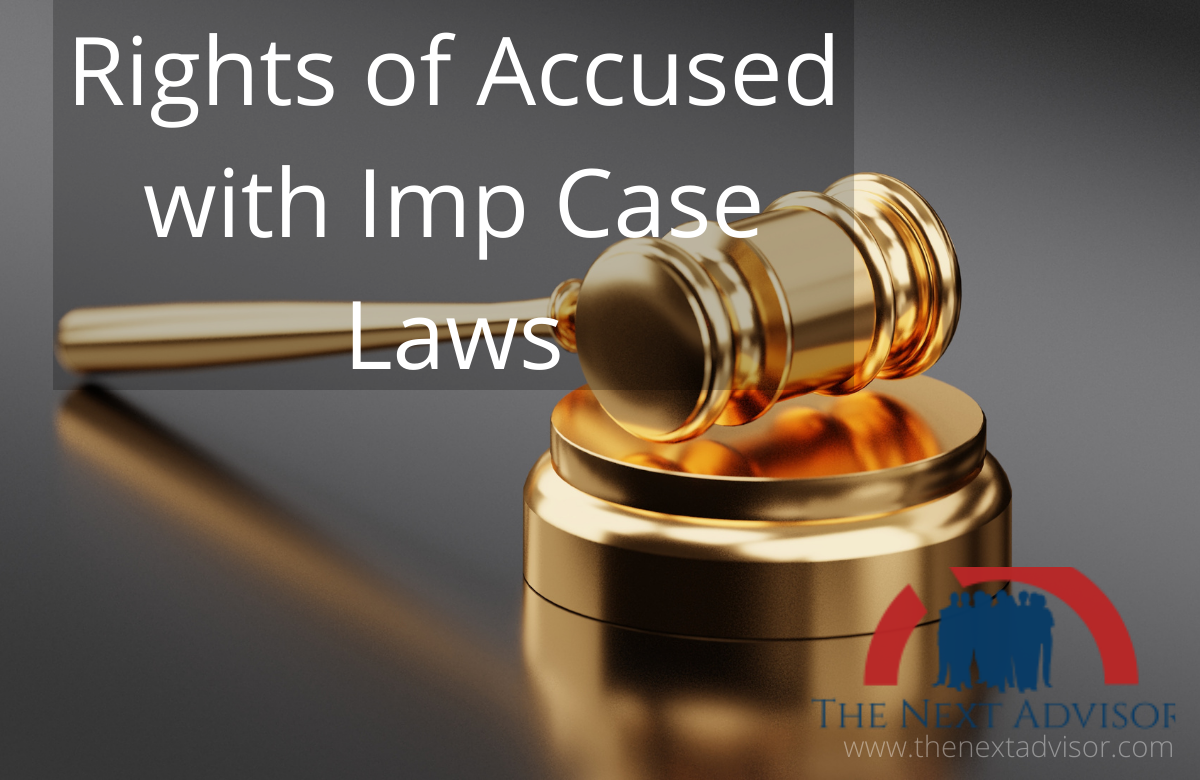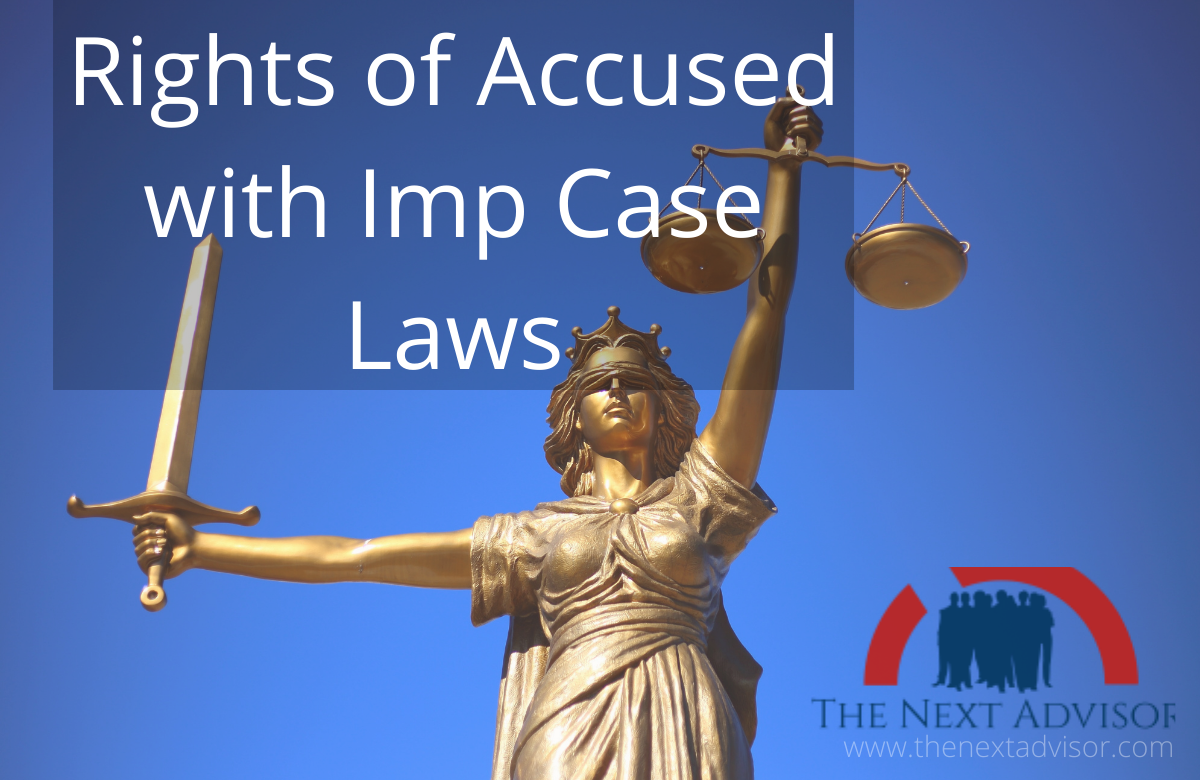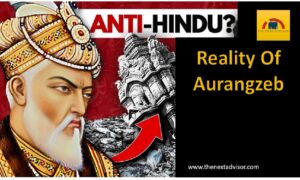Hi, friends today I am here to tell you information about the Rights of the accused, as you know accused has some rights like the accused will not be arrest without any reasonable grounds, or the accused should be present before the magistrate within 24 hours of his arrest or has right to get bail if the offense is available and if the offense is non-bailable so accused has right to take bail by the Court, and the magistrate will decide that whether he will get bail or not. So, the accused has so many rights under the law. One thing you should know that, considering the settled principle of Criminal Jurisprudence i.e., “Every Accused is Presumed To Be Innocent, Until Proved Guilty.” this presumption is under Human rights. Today I will tell you about the rights of Accused and explain it with the Landmark Judgment of the Supreme Court which will be very useful to you.
Protection from ex-fact law – Under Article 20(1) of the Constitution of India, a person shall be convicted of an offense only under that law which is the law in force. He shall not be convicted of any law other than the law in force, nor shall he be liable to more punishment, he shall be liable only to such punishment as is specified in the law in force. Law in force means the law in force or in practice.
In Buddh Singh v. the State of Haryana, it has been held that only punishment can be given to a person under the law in force at the time of committing the offense.
Protection from a double penalty (Nemo debit vis vexari)-
No one should be tried with respect to the same subject matter. CPC and CrPc in both this Code there are provisions for this double penalty, if we see in CPC, then the principle of Res-Judicata applies for it. And in The Code of Criminal Procedure U/S 300 -Person once convicted or acquitted not to be tried for the same offense.
Right to be given an FIR copy by the police– When any person is made an accused in any case, that person is told in that case in which case he has been imprisoned and under which section of the offense he has been charged. A case has been registered. The police will hand over a copy of the FIR to him and give full details of the case against him.

Rights of accused with imp case laws
Right to Bail – If the accused has been made an accused in a bailable offense, the person shall be informed by the police that the offense committed is bailable and may be released on bail in that offense.
In DVA Patnaik v State of Andhra Pradesh, it has been held that the running of electric current on the walls of the prison is violative of Article 21. Right to acquire, hold and dispose of property A person also has the right conferred by Article 21.
Right to free legal aid – In MM Haskat v State of Maharashtra, it has been laid down that free legal aid should be given to the convicted person, and copies of the judgment should be given free of cost for appeal.
Justice Krishna Iyer has said that free legal aid is the duty of the state and not a gift of the state. No person can be convicted without legal aid. If a person is poor, it does not mean that he has the right to legal aid.
If a person is poor, it does not mean that he should be denied the right to legal aid.
In the case of Husn Ara Khatoon also it has been held that the right to free legal aid is an essential part of a reasonable and fair procedure under Article 21.
Protection against solitary confinement – in Sunil Batra v. Administration of Delhi, challenged the validity of the petitioner’s Prisons Act, 1894, Section 302 on the ground that it violates Articles 14, 19, and 21 of the Constitution.
Hence it is invalid. Both the petitioners were in Tihar Jail. Sunil Batra, who was serving the death sentence, tried his solitary confinement, and Chal Sobhraj, who was undergoing trial, opted for iron shackles on his body on the ground that would save his life and personal liberty rights are violated.
Sunil Batra’s argument was rejected but Chaal Sobhraj’s argument was accepted as correct. Para 99 of the Punjab Jail Manual, which provides for fettering dangerous prisoners, was not considered law and was imprisoned around the clock. Sunil Batra’s argument was rejected but Chaal Sobhraj’s argument was accepted as correct. Para 99 of the Punjab Jail Manual which provides for fettering of dangerous prisoners was not considered as law and the rule of fettering prisoners round the clock was abolished.
Later, after hearing again in the case of Sunil Batra, some rules were passed and the treatment of under-trial prisoners like a convicted person was banned. Inhuman treatment of prisoners was banned and meeting of acquaintances and protection from solitary confinement was also banned.
Later, after hearing again in the case of Sunil Batra, some rules were passed and the treatment of under-trial prisoners like a convicted person was banned. Inhuman treatment of prisoners was banned and meeting of acquaintances and protection from solitary confinement was also banned.
Right to Speedy trial – The Supreme Court in the case of Abdul Rehman Antulay Vs R S Nayak has laid down detailed guidelines for speedy trial of accused in criminal cases. In this, the court has held that the Right to a speedy trial is the fundamental right under Article 21 of the Indian Constitution.
Compensation for death in police encounter – In the case People’s Union for Civil Liberties vs Union of India, the petitioner filed a public interest suit under Article 32 praying the court to order an inquiry into the fake encounter in which two persons were killed by the Imphal police. Instruct appropriate action against the guilty police officers
The police should provide compensation for death in an encounter and compensation to the family members of the deceased. It was held by the Court that the killing of two persons in a police encounter is a direct infringement of life and personal liberty under Article 21.
Compensation should be provided by the government to the next of kin of the deceased.
The right of a detained person to speak to his family members and a lawyer- The right of a detained person to speak to his family members and a lawyer is enshrined in the right of life and personal liberty to a prisoner detained under the Preventive Detention Act in the case of Francis Corelli v. Union Territory of Delhi, to visit his family and lawyer.
The court has also considered life and personal liberty to meet the lawyer and the family members and no condition can be laid down for any accused to meet the family and lawyer.
Protection against death in police custody- It is the duty of the state to protect persons arrested in police custody and prisoners in jail.
In DK Basu Vs. State of West Bengal, the Supreme Court has even said that – Death in police custody is the worst crime in a civilized society governed by the rule of law.
Produced before the magistrate within 24 hours- Section 167 of CrPC is considered important for the accused. Under this section, instructions have been given to the police that if it arrests any person, then he will have to be produced before the magistrate within 24 hours. Meaning if the police arrest a person, then in any case he will have to be produced before the police within 24 hours and the magistrate will have to tell on what basis he was arrested.

























